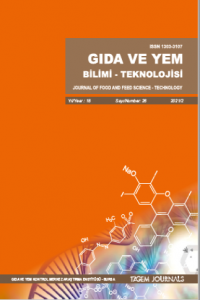Valide Adilmiş Aflatoksin Analiz Metodunun İç ve Dış Kalite Kontrol Analizleri İle İzlenmesi
Aflatoxins Validation, Quality Control Analysis, Duplicate Sample, Blank Analysis, CRM, RM or QCTM Material Analysis, Spike Samples Analysis, Proficiency Testing Programs, Calibration Control
Monitoring of the Validated Method for Aflatoxin Analysis with Internal and External Quality Control Analysis
___
- Anonymous, 1992. International Organization For Standardization. ISO Guide 30, Terms and Definitions used in connection with Reference Materials, 2nd Edition, Geneva, Switzerland.
- Anonymous, 1993. ASTM E 1301-95 Standard Guide for Proficiency Testing by Interlaboratory Comparisons. ISO Guide to the Expression of Uncertainty in Measurement.
- Anonymous, 1997. ISO/IEC Guide 43-1 Proficiency Testing by Interlaboratory Comparisons – Part: 1, Developing and Operation of Proficiency Testing Schemes.
- Anonymous, 1999a. ILAC Guidelines for the Requirements for the Competence of Providers Testing Schemes. Voting Draft 1.
- Anonymous, 1999b. NCSL Recommended Practice. Guide for Interlaboratory Comparisons. Mar, RP-12. Anonymous, 2000. International Organization For Standardization. ISO Guide 33, Uses of Certified Reference Materials, 2nd Edition, Geneva, Switzerland.
- Anonymous, 2002. Guide to Quality in Analytical Chemistry. An Aid to Accreditation, Cıtac / Eurachem Guıde.
- Anonymous, 2005. Practical guide for the validation, quality control, and uncertainty assessment of an alternative oenological analysis method. Compendıum Of Internatıonal Analysıs Of Methods - OIV Guide for the validation – quality Control. OIV-MA-AS1-12.
- Anonymous, 2012. TS EN ISO/IEC17025, 2012. General requirements for the competence of testing and calibration laboratories, Ankara.
- Anonymous, 2011. Turkish Food Codex Regulation contaminants. Mycotoxins in foodstuffs the official level control for getting sample, notification of sample preparation and analysis method criteria, notification no: (28157 Official newspaper) , Ankara.
- Baltaci, C., İlyasoğlu, H. and Cavrar, S., 2012. Aflatoxin levels in raw and processed hazelnuts in Turkey. Food Additives and Contaminants: Part B, 5(2), 83-86.
- Baltacı, C., İlyasoğlu, H. and Yüksel, F., 2013. Single-laboratory validation for the determination of aflatoxin B 1, B 2, G 1, and G 2 in foods based on immunoaffinity column and liquid chromatography with postcolumn derivatization and fluorescence detection. Food Analytical Methods, 6(1), 36-44.
- Schafer, W. D., Coverdale, B. J., Luxenberg, H. and Jin, Y., 2011. Quality control charts in large-scale assessment programs. Practical Assessment, Research & Evaluation, 16(15), 2.
- Taverniers, I., De Loose, M. and Van Bockstaele, E., 2004. Trends in quality in the analytical laboratory. II. Analytical method validation and quality assurance. TrAC Trends in Analytical Chemistry, 23(8), 535-552.
- Thompson, M. and Wood, R., 1993. The international harmonized protocol for the proficiency testing of (chemical) analytical laboratories (Technical Report). Pure and Applied Chemistry, 65(9), 2123-2144.
- ISSN: 1303-3107
- Yayın Aralığı: Yılda 2 Sayı
- Başlangıç: 2015
- Yayıncı: Bursa Gıda ve Yem Kontrol Merkez Araştırma Enstitüsü
Belgin SIRIKEN, Gökhan İNAT, Tuba YILDIRIM, Ceren YAVUZ, Alper ÇİFTCİ
Tuğba ATIŞ KARADUMAN, Ramazan GÖKÇE, Haluk ERGEZER, Tolga AKCAN
Valide Adilmiş Aflatoksin Analiz Metodunun İç ve Dış Kalite Kontrol Analizleri İle İzlenmesi
Cemalettin BALTACI, Zeynep AKŞİT
Fonksiyonel Süt Ürünlerinin Geliştirilmesinde Nutrasötik Bileşenler
Akrilamid; Toksisitesi, Azaltma Teknikleri ve Analiz Yöntemleri
Bazı Karma Yemlerde Çeşitli Anabolik Steroitlerin Tespiti
Vesile ÇETİN, Ali ÖZCAN, İsmail AZAR, Arzu YAVUZ, Neslihan TURAN
